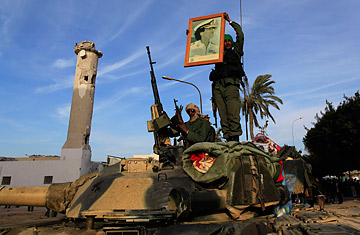
A Libyan army soldier holds a picture of leader Muammar Gaddafi near a destroyed mosque at Martyr's Square in the center of Zawiyah, March 11th, 2011.
After a two-week battle between Muammar Gaddafi's military and rebel forces, this oil-refinery town 30 miles west of the capital Tripoli is a deeply wounded and shaken place, in which terror and devastation show how severely the anti-government fighters have been smashed in western Libya — and how fierce a battle they put up.
In Zawiyah's central square — the heart of the revolt here — mangled apartment and office buildings stand bomb-blasted and gouged with rocket holes, grotesque contortions of their original shapes. Every window is smashed. Lampposts lie across the streets, a tangle of metal. The minaret of the mosque on the south side of town is a sawn-off brick stump, with its loudspeaker dangling loose down its side from an electrical wire. And in the middle of the square's garden is now a piece of open ground — which until Thursday, contained the graves of rebel fighters killed during the past two weeks' battle. "More than 10 people were buried right here," mutters one man under his breath grimly to me, nodding in the direction of the ground, during a government-escorted visit by about 100 foreign journalists to the town on Friday evening. Officials organized the trip two days after declaring that the military had routed the rebels and won a key battleground virtually on the doorstep of Gaddafi's stronghold of Tripoli.
By Friday, there was no doubt who controlled Zawiyah. Soldiers stood watch atop tanks on the side streets, and foot soldiers and policemen guarded the street corners, their Gaddafi-green scarves around their necks. On numerous occasions, soldiers stepped forward to stop us from talking to local residents, one telling us sharply, "go, talk to those real people," as he gestured to a gathering of people chanting support for Gaddafi and waving green flags. Rebels seized the town on Feb. 25, threatening to encircle Gaddafi's capital with anti-government forces. Gaddafi launched a massive military offensive against Zawiyah on March 3, sending troops to storm the city with tanks, and shutting down all mobile-phone networks as they pummeled rebel positions with heavy weaponry.
Beyond the victory celebration of about 200 people, Zawiyah's streets were deserted and eerily silent for a town of 200,000. Buildings appear empty — perhaps with residents staying indoors, or having fled the fighting. Asked by journalists on Friday night why Zawiyah seemed empty, Deputy Foreign Minister Khaled Kaim said, "They are inside their homes in their houses. You can go knock on doors, door by door."
Despite close police scrutiny, two residents on separate occasions found ways to let journalists know that the situation in Zawiyah was grave. The resident who gestured to the graves and said softly in Arabic that it was too dangerous to talk, and then repeated in English, "Can't talk. Can't talk." And across the square, when asked if they were happy with the victory, two young men looked glum and silent. Then one said stone-facedly, "one hundred percent," while shaking his head emphatically at the same time, conveying that the opposite was true.
There were expressions of anger against the rebels too, from soldiers who repeated Gaddafi's claims that the uprising was instigated by al-Qaeda — a claim which appears to be baseless. "People came from Tunisia and Egypt," Osama Ahmed, 34, a soldier, said. "They used the mosque to call people to fight."
There were signs everywhere of vain attempts to hide the gruesome horrors of war. Burned, mangled trucks had been hidden down a side street off the square. Lengths of green and white fabric hung down the sides of battle-scarred buildings, and on one, fresh paint covered graffiti — the day before it was still a large rebel flag. Two giant earth-moving vehicles hauled rubble down one side street, helped by about 15 workers from Chad and Bangladesh, dressed in orange vests and carrying brooms and shovels.
But no amount of fabric or hurried cleaning could hide the devastation in central Zawiyah. On the far side of the square, the eight-floor, four-star Zawia Jewel Hotel is now riddled with holes and barely intact, and its soaring glass entryway is shattered, while the Bank of Commerce and Development next door has partially caved in from rocket damage.
Beyond the government's attempts to hide the war damage, however, there are far more disturbing secrets in Zawiyah, which might take some time to surface. Deputy Foreign Minister Kaim told reporters Friday night that 40 people were killed in Zawiyah's battle but officials have not revealed how many supporters of the rebels have been arrested since Wednesday, when the military seized back the town. And there is no information about what kind of retribution the residents might face now, for having supposedly backed the anti-government fighters.
Mobile-phone communication has been cut since March 3, making it all-but impossible for journalists to interview residents. And most journalists who have tried to sneak into Zawiyah during the past two weeks have been arrested; only a few have succeeded in slipping through the tight military cordon around the town, providing the few independent details known about the battle — for example, that there were rebel graves in the middle of the square until Thursday. And three BBC journalists who were jailed for one night after attempting to reach Zawiyah without a government escort later reported seeing many Zawiyah residents dragged into custody and severely beaten.
